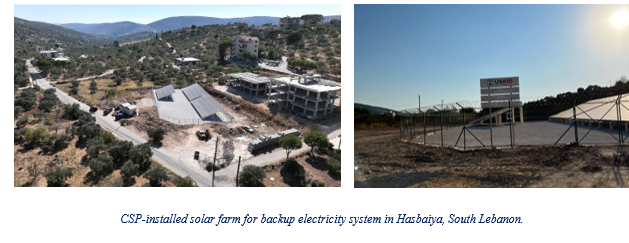USAID-funded Solar System Enhances Access to Household Electricity For Residents of Hasbaiya
Hasbaiya, South Lebanon, is home to around 8,000 residents and more than 700 refugees who, amidst the country’s debilitating energy crisis, have been grappling with lengthy power outages, forcing the municipality to rely on eleven backup generators for the supply of electricity. However, with the devaluation of the national currency, their operation and maintenance has strained the municipal budget and become an increasingly unaffordable burden on local households. The consequent degradation of living conditions has resulted in rising intercommunal tensions within the town. In response, USAID’s Community Support Program (CSP) revolutionized the town’s backup electricity infrastructure by installing solar photovoltaic modules. By the end of January 2023, CSP had successfully tested and operated the system and is currently finalizing minor works before handing the system over to the municipality. Meanwhile, this electricity system is already enhancing access to electricity for an estimated 8,700 residents in Hasbaiya, while reducing the financial burdens of securing backup electricity on both households and the municipality – enabling overall savings in fuel and maintenance costs estimated at around $30,000/year.
“We started successfully operating the USAID-funded solar system, and so far, have been able to save around $8,000 on fuel expenses over the months of November and December alone,” stated Mr. Labib el Hamra, Mayor of Hasbaiya municipality.

